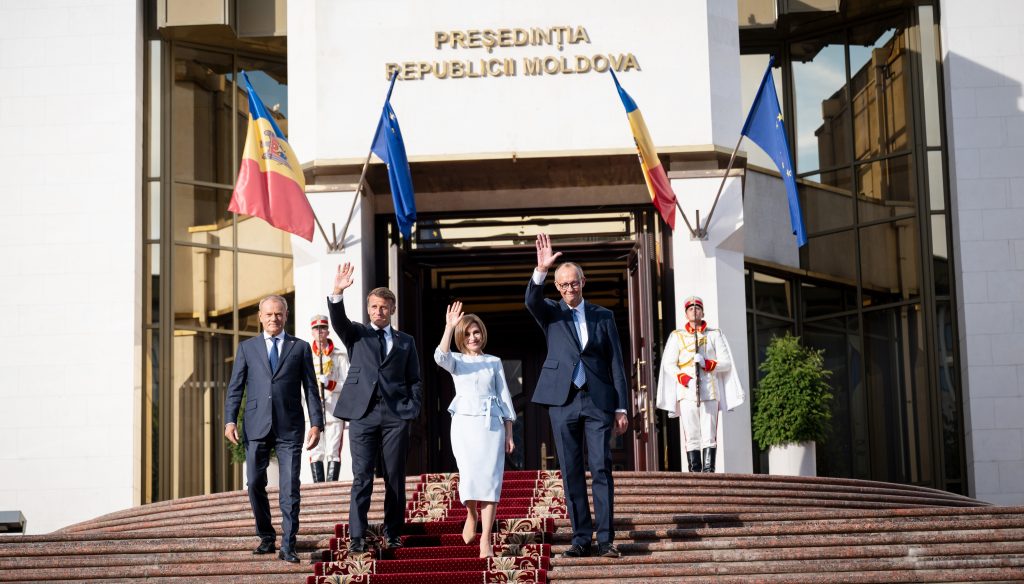Nannette Cazaubon – European News Journal, Paris

There was widespread relief across Europe after Moldova’s pro-European Party of Action and Solidarity (PAS) won a landslide victory over the pro-Russian Patriotic Bloc in crucial parliamentary elections on 28 September 2025.
The election result was immediately welcomed by many Western and European leaders. EU High Representative Kaja Kallas said: “Despite Russia’s massive efforts to spread disinformation and buy votes, no force can stop a people committed to freedom.”
Indeed, there was much at stake in these elections – both for Moldova and for Europe, for which maintaining Moldova’s EU ambitions has become a strategic priority in the tense geopolitical context.
Wedged between EU and NATO member Romania and war-torn Ukraine, the small Republic of Moldova (population 2.6 million), with which the EU started official accession talks in June 2024, is a polarised country. Torn between western aspirations and pro-Russian movements under Moscow’s influence, the former Soviet republic is constantly exposed to Russian destabilisation campaigns.
.Pro-European President Maia Sandu has spent the past month repeatedly warning of significant Russian interference in her country and seeking European support.
At the end of August, three European leaders paid a highly symbolic visit to the country’s capital. The date was not chosen by chance. Invited to participate in the festivities marking the 34th anniversary of Moldova’s independence, French President Emmanuel Macron, German Chancellor Friedrich Merz, and Polish Prime Minister Donald Tusk met with Moldova’s President Maia Sandu on 27 August, two days before the start of the campaign for the parliamentary elections.
A month earlier, President Sandu, who since her re-election in November 2024 has strengthened Moldova’s commitment to the west, had already accused Russia of wanting to control Moldova from autumn onwards and of planning a complex destabilisation campaign including vote-buying and illicit financing via cryptocurrencies to help anti-European and pro-Russian parties win the elections and prevent Moldova from joining the EU.
In the presence of the three European leaders in Chișinău, Sandu again accused Russia of destabilising her democratic country through “interference in our elections, illegal external financing, disinformation campaigns, cyber-attacks, paid protests, and the use of the church and online platforms for anti-European messages.”
Macron, Merz and Tusk delivered strong messages of support for Moldova’s EU aspirations. Chancellor Merz said that “the door to the European Union is open and you are wholeheartedly welcome in the European Union” and Prime Minister Tusk that “Europe will be stronger with Moldova.” President Macron had harsh words for Russia’s anti-European statements: “Kremlin propaganda tells us that Europeans want to prolong the war [in Ukraine] and that the European Union oppresses people. These are lies. Unlike Russia, the European Union does not threaten anyone, it respects everyone’s sovereignty”, Macron said.
For President Sandu, there is no alternative to Europe for her country. “Russia’s war against Ukraine demonstrates every day that Europe means freedom and peace; Putin’s Russia, on the other hand, means war and death,” she said.
Invited to address the European Parliament on 9 September, she was even clearer, warning that if Moldovan democracy cannot be protected, “then no democracy in Europe is safe.” She added that “the Kremlin’s objective is clear: to capture Moldova through the ballot box, use us against Ukraine, and turn us into a launching pad for hybrid attacks against the European Union.”
The day after the election of 28 September, Polish Prime Minister Donald Tusk declared on X: “It took real courage of the Moldovan nation and Maia Sandu personally to win this election. Not only did you save democracy and kept the European course, but you have also stopped Russia in its attempts to take control over the whole region. A good lesson for us all.”






